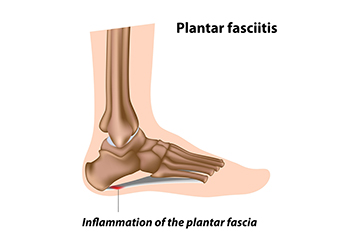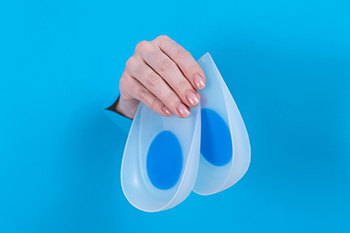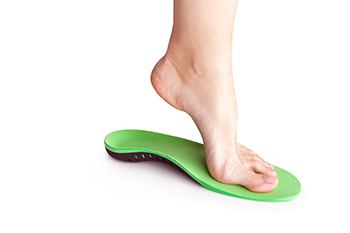Items filtered by date: July 2024
What Can Cause Plantar Fasciitis?

The plantar fascia is a thick band of tissue that connects the heel to the toes. Plantar fasciitis, an inflammation of this tissue, can stem from various biomechanical factors. Problems like an abnormal lower leg structure, limited ankle movement, and inward or outward heel or foot angles can strain the plantar fascia. These abnormalities can alter foot mechanics, leading to excessive tension and micro-tears in the fascia. Symptoms include sharp heel pain, especially after prolonged periods of standing or walking, which tends to improve with rest but worsens upon resuming activity. Early morning stiffness and tenderness in the heel or arch are also common. Addressing these biomechanical issues through proper footwear, orthotics, stretching exercises, and avoiding excessive strain on the feet can help to manage symptoms and prevent recurrence of this ailment. If you have been afflicted by plantar fasciitis, it is suggested that you confer with a podiatrist who can offer you various effective treatment methods.
Plantar fasciitis is a common foot condition that is often caused by a strain injury. If you are experiencing heel pain or symptoms of plantar fasciitis, contact Pasquale Cancelliere, DPM from Candria Foot and Ankle Specialists. Our doctor can provide the care you need to keep you pain-free and on your feet.
What Is Plantar Fasciitis?
Plantar fasciitis is one of the most common causes of heel pain. The plantar fascia is a ligament that connects your heel to the front of your foot. When this ligament becomes inflamed, plantar fasciitis is the result. If you have plantar fasciitis you will have a stabbing pain that usually occurs with your first steps in the morning. As the day progresses and you walk around more, this pain will start to disappear, but it will return after long periods of standing or sitting.
What Causes Plantar Fasciitis?
- Excessive running
- Having high arches in your feet
- Other foot issues such as flat feet
- Pregnancy (due to the sudden weight gain)
- Being on your feet very often
There are some risk factors that may make you more likely to develop plantar fasciitis compared to others. The condition most commonly affects adults between the ages of 40 and 60. It also tends to affect people who are obese because the extra pounds result in extra stress being placed on the plantar fascia.
Prevention
- Take good care of your feet – Wear shoes that have good arch support and heel cushioning.
- Maintain a healthy weight
- If you are a runner, alternate running with other sports that won’t cause heel pain
There are a variety of treatment options available for plantar fasciitis along with the pain that accompanies it. Additionally, physical therapy is a very important component in the treatment process. It is important that you meet with your podiatrist to determine which treatment option is best for you.
If you have any questions, please feel free to contact our offices located in Londonderry, NH and Salem, NH . We offer the newest diagnostic and treatment technologies for all your foot care needs.
We Can Treat Your Foot or Ankle Pain
Symptoms and Treatment of Achilles Tendon Injuries
 Achilles tendon injuries are prevalent among people who engage in physical activities, from athletes to casual exercisers. The Achilles tendon, which connects the calf muscles to the heel bone, is critical for movements like standing on toes and propelling forward when walking or running. Common injuries include Achilles tendinopathy, which involves tiny tears from overuse and results in pain, swelling, and morning stiffness. More severe Achilles tendon injuries, such as partial or complete tears, cause sudden, sharp pain, swelling, and difficulty pointing the foot down or standing on tiptoe. A podiatrist can diagnose these injuries through a physical exam, ultrasound, X-rays, or MRI scans to assess the extent of damage. Treatment depends on the injury's severity. Mild cases may be managed with rest and stretching exercises, while severe tears might require surgery and immobilization with a cast or brace. If you are experiencing pain resulting from an Achilles tendon injury, it is suggested that you schedule an appointment with a podiatrist for an exam, diagnosis, and treatment options.
Achilles tendon injuries are prevalent among people who engage in physical activities, from athletes to casual exercisers. The Achilles tendon, which connects the calf muscles to the heel bone, is critical for movements like standing on toes and propelling forward when walking or running. Common injuries include Achilles tendinopathy, which involves tiny tears from overuse and results in pain, swelling, and morning stiffness. More severe Achilles tendon injuries, such as partial or complete tears, cause sudden, sharp pain, swelling, and difficulty pointing the foot down or standing on tiptoe. A podiatrist can diagnose these injuries through a physical exam, ultrasound, X-rays, or MRI scans to assess the extent of damage. Treatment depends on the injury's severity. Mild cases may be managed with rest and stretching exercises, while severe tears might require surgery and immobilization with a cast or brace. If you are experiencing pain resulting from an Achilles tendon injury, it is suggested that you schedule an appointment with a podiatrist for an exam, diagnosis, and treatment options.
Achilles tendon injuries need immediate attention to avoid future complications. If you have any concerns, contact Pasquale Cancelliere, DPM of Candria Foot and Ankle Specialists. Our doctor can provide the care you need to keep you pain-free and on your feet.
What Is the Achilles Tendon?
The Achilles tendon is a tendon that connects the lower leg muscles and calf to the heel of the foot. It is the strongest tendon in the human body and is essential for making movement possible. Because this tendon is such an integral part of the body, any injuries to it can create immense difficulties and should immediately be presented to a doctor.
What Are the Symptoms of an Achilles Tendon Injury?
There are various types of injuries that can affect the Achilles tendon. The two most common injuries are Achilles tendinitis and ruptures of the tendon.
Achilles Tendinitis Symptoms
- Inflammation
- Dull to severe pain
- Increased blood flow to the tendon
- Thickening of the tendon
Rupture Symptoms
- Extreme pain and swelling in the foot
- Total immobility
Treatment and Prevention
Achilles tendon injuries are diagnosed by a thorough physical evaluation, which can include an MRI. Treatment involves rest, physical therapy, and in some cases, surgery. However, various preventative measures can be taken to avoid these injuries, such as:
- Thorough stretching of the tendon before and after exercise
- Strengthening exercises like calf raises, squats, leg curls, leg extensions, leg raises, lunges, and leg presses
If you have any questions please feel free to contact our offices located in Londonderry, NH and Salem, NH . We offer the newest diagnostic tools and technology to treat your foot and ankle needs.
Reasons for Wearing Heel Cups

Heel cups are invaluable for individuals who spend long hours on their feet, providing essential support and cushioning to alleviate heel pain. These shoe inserts are particularly beneficial for those suffering from conditions like plantar fasciitis, which can be aggravated by insufficient support and poor shock absorption. Heel cups cushion the entire heel, from the point of impact with the ground to the edges and back, distributing the shock more evenly to reduce pressure on any single area. This helps make walking, running, and standing much more comfortable. Additionally, the gentle compression from heel cups can help reduce swelling in the heel and ankle. Professions such as nursing, retail, and culinary arts often involve prolonged standing. By using heel cups, people working in these fields can enhance their comfort and reduce heel pain. Consulting with a podiatrist can help in selecting the right heel cups and ensuring they are correctly fitted. If you experience heel pain, it is suggested that you make an appointment with a podiatrist for an exam and treatment.
Many people suffer from bouts of heel pain. For more information, contact Pasquale Cancelliere, DPM of Candria Foot and Ankle Specialists. Our doctor can provide the care you need to keep you pain-free and on your feet.
Causes of Heel Pain
Heel pain is often associated with plantar fasciitis. The plantar fascia is a band of tissues that extends along the bottom of the foot. A rip or tear in this ligament can cause inflammation of the tissue.
Achilles tendonitis is another cause of heel pain. Inflammation of the Achilles tendon will cause pain from fractures and muscle tearing. Lack of flexibility is also another symptom.
Heel spurs are another cause of pain. When the tissues of the plantar fascia undergo a great deal of stress, it can lead to ligament separation from the heel bone, causing heel spurs.
Why Might Heel Pain Occur?
- Wearing ill-fitting shoes
- Wearing non-supportive shoes
- Weight change
- Excessive running
Treatments
Heel pain should be treated as soon as possible for immediate results. Keeping your feet in a stress-free environment will help. If you suffer from Achilles tendonitis or plantar fasciitis, applying ice will reduce the swelling. Stretching before an exercise like running will help the muscles. Using all these tips will help make heel pain a condition of the past.
If you have any questions please contact our offices located in Londonderry, NH and Salem, NH . We offer the newest diagnostic and treatment technologies for all your foot and ankle needs.
Causes of Toe Pain
 Toe pain can arise from various conditions, each requiring careful attention. Bunions, a common cause, involve a bony bump forming at the base of the big toe, leading to discomfort and swelling. Arthritis, particularly osteoarthritis and rheumatoid arthritis, can cause joint inflammation and stiffness, affecting toe movement. Infections, whether fungal or bacterial, may result in redness, swelling, and severe pain. Injuries such as fractures or sprains often lead to immediate and intense pain, impairing mobility. Peripheral artery disease, or PAD, restricts blood flow to the extremities, causing pain, especially during walking. If you have toe pain, it is suggested that you visit a podiatrist who can determine the cause and offer appropriate treatment solutions.
Toe pain can arise from various conditions, each requiring careful attention. Bunions, a common cause, involve a bony bump forming at the base of the big toe, leading to discomfort and swelling. Arthritis, particularly osteoarthritis and rheumatoid arthritis, can cause joint inflammation and stiffness, affecting toe movement. Infections, whether fungal or bacterial, may result in redness, swelling, and severe pain. Injuries such as fractures or sprains often lead to immediate and intense pain, impairing mobility. Peripheral artery disease, or PAD, restricts blood flow to the extremities, causing pain, especially during walking. If you have toe pain, it is suggested that you visit a podiatrist who can determine the cause and offer appropriate treatment solutions.
Toe pain can disrupt your daily activities. If you have any concerns, contact Pasquale Cancelliere, DPM of Candria Foot and Ankle Specialists. Our doctor can provide the care you need to keep you pain-free and on your feet.
What Causes Toe Pain?
Most severe toe pain is caused due to a sports injury, trauma from dropping something heavy on the toe, or bumping into something rigid. Other problems can develop over time for various reasons.
Toe pain can be caused by one or more ailments. The most common include:
- Trauma
- Sports injury
- Wearing shoes that are too tight
- Arthritis
- Gout
- Corns and calluses
- Hammertoe
- Bunions
- Blisters
- Ingrown toenails
- Sprains
- Fractures (broken bones)
- Dislocations
When to See a Podiatrist
- Severe pain
- Persistent pain that lasts more than a week
- Signs of infection
- Continued swelling
- Pain that prevents walking
Diagnosis
In many cases the cause of toe pain is obvious, but in others, a podiatrist may want to use more advanced methods to determine the problem. These can range from simple visual inspections and sensation tests to X-rays and MRI scans. Prior medical history, family medical history, and any recent physical traumatic events will all be taken into consideration for a proper diagnosis.
Treatment
Treatments for toe pain and injuries vary and may include shoe inserts, padding, taping, medicines, injections, and in some cases, surgery. If you believe that you have broken a toe, please see a podiatrist as soon as possible.
If you have any questions please feel free to contact our offices located in Londonderry, NH and Salem, NH . We offer the newest diagnostic tools and technology to treat your foot and ankle needs.
Different Types of Orthotics for Foot Pain
 Orthotics are devices placed inside shoes to support and comfort the feet, often used to treat foot pain. Custom orthotics are tailor-made for an individual's foot shape and specific needs, while prefabricated orthotics are mass-produced and designed to fit most feet. Both types of orthotics help alleviate foot pain, improve alignment, and provide support. They are commonly used for conditions like plantar fasciitis, flat feet, high arches, and arthritis. Custom orthotics offer precise correction and cushioning, addressing unique foot structures and biomechanical issues. They can be especially beneficial for severe or specific conditions. Prefabricated orthotics are more affordable and accessible, providing adequate support for mild to moderate foot pain. They can be effective for general use but may not address all individual needs as accurately as custom orthotics. Both types of orthotics are useful, but their effectiveness depends on the specific foot condition and individual requirements. For proper assessment and advice, it is suggested that you visit a podiatrist.
Orthotics are devices placed inside shoes to support and comfort the feet, often used to treat foot pain. Custom orthotics are tailor-made for an individual's foot shape and specific needs, while prefabricated orthotics are mass-produced and designed to fit most feet. Both types of orthotics help alleviate foot pain, improve alignment, and provide support. They are commonly used for conditions like plantar fasciitis, flat feet, high arches, and arthritis. Custom orthotics offer precise correction and cushioning, addressing unique foot structures and biomechanical issues. They can be especially beneficial for severe or specific conditions. Prefabricated orthotics are more affordable and accessible, providing adequate support for mild to moderate foot pain. They can be effective for general use but may not address all individual needs as accurately as custom orthotics. Both types of orthotics are useful, but their effectiveness depends on the specific foot condition and individual requirements. For proper assessment and advice, it is suggested that you visit a podiatrist.
If you are having discomfort in your feet and would like to try orthotics, contact Pasquale Cancelliere, DPM from Candria Foot and Ankle Specialists. Our doctor can provide the care you need to keep you pain-free and on your feet.
What Are Orthotics?
Orthotics are inserts you can place into your shoes to help with a variety of foot problems such as flat feet or foot pain. Orthotics provide relief and comfort for minor foot and heel pain but can’t correct serious biomechanical problems in your feet.
Over-the-Counter Inserts
Orthotics come in a wide variety of over-the-counter inserts that are used to treat foot pain, heel pain, and minor problems. For example, arch supports can be inserted into your shoes to help correct overarched or flat feet, while gel insoles are often used because they provide comfort and relief from foot and heel pain by alleviating pressure.
Prescription Orthotics
If over-the-counter inserts don’t work for you or if you have a more severe foot concern, it is possible to have your podiatrist prescribe custom orthotics. These high-quality inserts are designed to treat problems such as abnormal motion, plantar fasciitis, and severe forms of heel pain. They can even be used to help patients suffering from diabetes by treating foot ulcers and painful calluses and are usually molded to your feet individually, which allows them to provide full support and comfort.
If you are experiencing minor to severe foot or heel pain, it’s recommended to speak with your podiatrist about the possibilities of using orthotics. A podiatrist can determine which type of orthotic is right for you and allow you to take the first steps towards being pain-free.
If you have any questions please contact our offices located in Londonderry, NH and Salem, NH . We offer the newest diagnostic and treatment technologies for all your foot and ankle needs.




